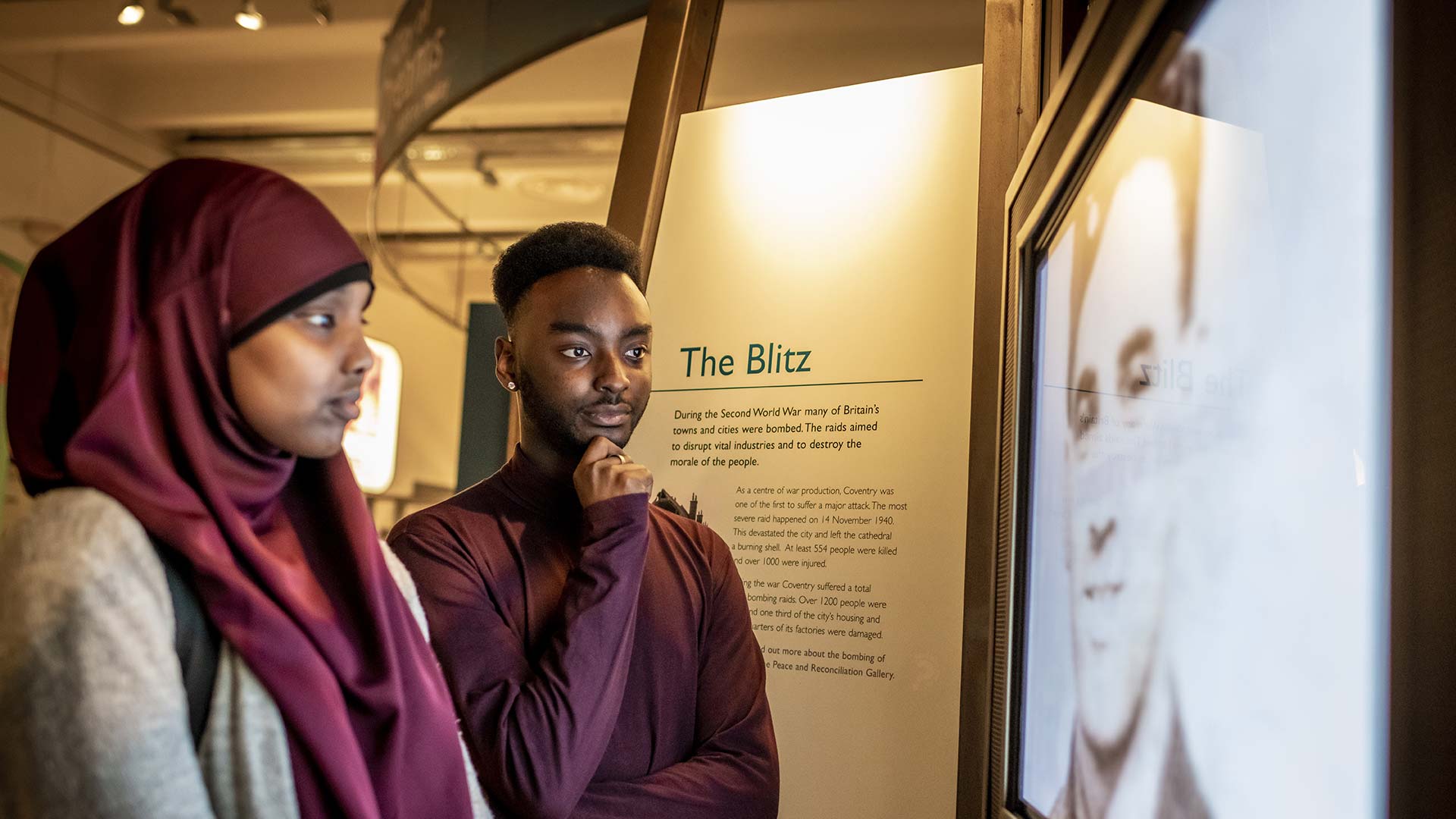Search
Sociology BA (Hons)
Study level: Undergraduate
Why do social inequalities exist? How do we begin to challenge them? Deepen your understanding of society and develop the tools to create impactful social change.
Course features
Year of entry
2026-27
Location
Coventry University (Coventry)
Study mode
Full-time
Sandwich
Duration
3 years full-time
4 years sandwich
Course code
L300
Start date
September 2026
November 2026
January 2027
March 2027
May 2027
July 2027
Course overview
This course is ideal if you have an inquisitive, socially conscious mind and enjoy questioning the world around you. Our modules aim to equip you with the practical skills and critical thinking needed to develop an impactful career in social justice, education, policy and government, business or research.
- Understanding and challenging society: investigate how social institutions like government, education and family shape our lives, and how social movements drive change.
- Emerging perspectives on identities: explore ideas about identity, how we experience the world through our bodies, and the impact of social structures and marginalisation.
- Interrogating culture: explore the ways that media and culture shape society, investigating the influence of digital media, pop culture and communication on identity, power and social change.
Rated Gold Overall
Teaching Excellence Framework (TEF) 20235 QS Stars for Teaching and Facilities
QS Stars University RatingsTop 5 Student City in England (Coventry)
QS Best Student Cities Index 2026Why you should study this course
- Project-based learning: actively engage in real-world, meaningful projects, work on complex problems, create tangible solutions and develop essential skills such as critical thinking, collaboration and communication. Assessment is designed to reflect the type of work carried out by sociology graduates. You might produce briefing papers, campaigns, podcasts, posters and presentations that showcase your expertise and real-world readiness.
- Career-ready: this course goes beyond traditional assessments using industry-focused assessments and learning activities. It aims help you develop employer-valued skills and prepare for a career in academia, the social justice and charity sectors, or the private sector.
- Go beyond the classroom: engage with contemporary social challenges. Explore Coventry’s historical sites to understand their sociological impact, gaining first-hand experience to help prepare you to drive meaningful change in society.
- Join a supportive community: be part of an inclusive, open-minded environment that challenges inequality. Experience a mix of theoretical learning and practical application, with group teaching, approachable staff and active student engagement. This helps to foster a supportive learning environment and promote a sense of community, both academically and socially.
- Build your experience: take advantage of optional placements2 in social research, education or community organisations. Previous students have secured placements as a research assistant for the Gallery of Living History, a youth engagement officer for the Positive Youth Foundation, and a student resilience worker for Positive Choices.
What you'll study
We regularly review our course content, to make it relevant and current for the benefit of our students. For these reasons, course modules may be updated.
How you'll learn
In this course, you'll learn through hands-on activities and real-world examples, using the same approaches professionals use in the field. It’s all about helping you build the skills you need to feel confident and prepared for your future career.
Teaching methods may include:
- interactive lectures that may be delivered online or face-to-face
- seminars involving smaller groups working on problems or holding discussions and debates about issues arising in the lectures
- workshops involving a combination of content delivery and group work
- working together on projects to help develop critical skills such as problem-solving, teamwork and creative thinking
- simulations, enabling you to apply theoretical knowledge to practical scenarios.
Teaching contact hours
As a full-time undergraduate student, you will study modules totalling 120 credits each academic year. You will normally study one 30-credit module at a time. A typical 30-credit module requires a total of 300 hours of study made up of teaching contact hours, guided and independent study.
Teaching hours
Teaching hours may vary depending on your year of study and selected modules. During your first year, you can expect 12-15 teaching hours each week. You will also have the option to attend additional sessions, including time with a progress coach or to meet with staff for advice and feedback. As you progress through your studies, teaching hours may reduce.
Guided and independent study
Throughout your studies, you will be expected to spend time in guided and independent study to make up the required study hours per module. You’ll be digging deeper into topics, review what you’ve learned and complete assignments. This can be completed around your personal commitments. As you progress through your studies, you’ll spend more time in independent study.
Online learning
As an innovative university, we use different teaching methods including online tools and emerging technologies. So, some of your teaching hours and assessments may be delivered online.
Assessment
This course incorporates new and innovative assessment methods aligned with current industry standards, providing you with practical, real-world skills designed to advance your professional readiness and career prospects.
Assessment methods may include:
- writing exercises such as essays, reports, policy reviews and briefings
- live simulations and reflective journals about them
- group and individual presentations
- posters and infographics
- problem-solving scenarios such as case studies
- podcasts, academic posters and vlogs.
The Coventry University Group assessment strategy ensures that our courses are fairly assessed and allows us to monitor student progression towards the intended learning outcomes.
Entry requirements
Typical entry requirements:
Fees and funding
| Student | Full-time | Part-time |
|---|---|---|
| UK, Ireland*, Channel Islands or Isle of Man | 2026/27 fees TBC 2025/26 fees: £9,535 per year |
Not available |
| EU | 2026/27 fees TBC 2025/26 fees: £9,535 per year with EU Support Bursary** 2026/27 fees TBC 2025/26 fees: £16,800 per year without EU Support Bursary** |
Not available |
| International | 2026/27 fees TBC 2025/26 fees: £16,800 per year |
Not available |
If you choose to study this course with a professional placement2 or study abroad year, you will need to pay a tuition fee3 to cover your academic support throughout your placement year. Students commencing their professional placement in the academic year 2027/28 will pay £1,500 if they are paying UK fees, or £1,800 if they are paying international fees.
For advice and guidance on tuition fees and student loans visit our Undergraduate Finance page and see The University’s Tuition Fee and Refund Terms and Conditions.
The University will charge the tuition fees that are stated in the above table for the first Academic Year of study. The University will review tuition fees each year. For UK (home) students, if Parliament permits an increase in tuition fees, the university may increase fees for each subsequent year of study in line with any such changes. Note that any increase is expected to be in line with inflation.
If you choose to study this course with a professional placement, the University will charge the tuition fees stated above for those on a placement during Academic Year 2027/28. The University will review professional placement tuition fees each year. For UK (home) students, the University may increase fees for each subsequent year of study, but such that it will be no more than 5% above inflation.
For international students, we may increase fees each year, but such increases will be no more than 5% above inflation. If you defer your course start date or have to extend your studies beyond the normal duration of the course (e.g. to repeat a year or resit examinations) the University reserves the right to charge you fees at a higher rate and/or in accordance with any legislative changes during the additional period of study.
We offer a range of International scholarships to students all over the world. For more information, visit our International Scholarships page.
Tuition fees cover the cost of your teaching, assessments, facilities and support services. There may be additional costs not covered by this fee such as accommodation and living costs, recommended reading books, stationery, printing and re-assessments should you need them. Find out what's included in your tuition costs.
The following are additional costs not included in the tuition fees:
- Any optional overseas field trips or visits: £400+ per trip.
- Any costs associated with securing, attending or completing a placement (whether in the UK or abroad).
*Irish student fees
The rights of Irish residents to study in the UK are preserved under the Common Travel Area arrangement. If you are an Irish student and meet the residency criteria, you can study in England, pay the same level of tuition fees as English students and utilise the Tuition Fee Loan.
**EU Support Bursary
Following the UK's exit from the European Union, we are offering financial support to all eligible EU students who wish to study an undergraduate or a postgraduate degree with us full-time. This bursary will be used to offset the cost of your tuition fees to bring them in line with that of UK students. Students studying a degree with a foundation year with us are not eligible for the bursary.
Facilities
Students will benefit from studying on our well-equipped, modern campus4.

Academic support
No matter which degree you’re studying, you’ll find a lot of support on campus, including the Centre of Academic Writing and sigma, which offers mathematics and statistics support.

The Library
You will benefit from our support designed to help you succeed and our industry-relevant teaching and resources. These include our modern library and computing facilities, dedicated careers advice and Students’ Union.

George Eliot building
Named after one of the leading writers of the Victorian age, the George Eliot building is the city-centre home of sociology studies at Coventry University. Mingle with like-minded students, cross the Edible Garden campus to relax at the Hub, or take the few minutes walk to immerse yourself in books at the Lanchester library.
Facilities are subject to availability. Access to some facilities (including some teaching and learning spaces) may vary from those advertised and/or may have reduced availability or restrictions where the university is following public authority guidance, decisions or orders.
Careers and opportunities
Throughout the course, you should develop a broad range of highly valued skills to reflect the changing and dynamic needs of industry, including exceptional communication, project planning, critical thinking and analysis, crisis management, problem-solving and powerful presentation and listening skills.
On successful completion of the course, you should be a globally and interculturally aware graduate ready to make a difference in the world. You could find yourself working in the following roles:
- Teacher (required PGCE or equivalent)
- Education welfare officer
- Human rights or civil liberties advocate
- Public relations or communications officer
- Market research analyst
- Civil servant
- Equality, diversity and inclusion officer
- Corporate social responsibility advisor.
The graduate destinations listed above illustrate potential career paths. You may need to gain additional qualifications or practical experience, pass professional examinations, complete training, cover associated costs and meet specific visa or immigration requirements to secure employment in these fields.
Where our graduates work
Past graduates are now employed in a range of private and public sector industries ranging from banking and finance, media, education, the civil service, police forces, local authorities, charities and Non-Governmental Organisations (NGOs).
Further study
You can choose to continue your studies at Coventry University with the Sociology and Social Research MA. You may be entitled to an alumni discount on your fees if you decide to extend your time with us by progressing from undergraduate to postgraduate study.

Discover Phoenix+
Phoenix+ brings you together with other students to learn, experience and develop essential knowledge and skills. Whatever destination you choose, it's about preparing you for life after university.
Learn more about Phoenix+How to apply
You may also like

Sociology and Criminology BA (Hons)

Politics BA (Hons)






